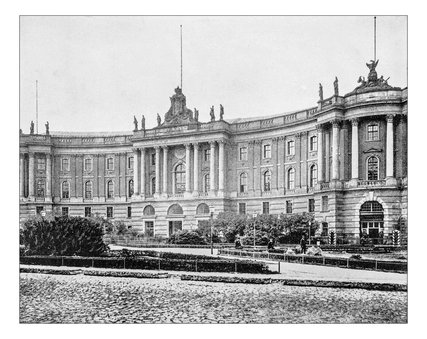
Magnus Hirschfeld - Soul of the queer community
Memorial Day on May 14
Magnus Hirschfeld is considered a co-founder of the world's first homosexual movement. More than a hundred years ago, the Jewish doctor and sex researcher was already campaigning for the rights of gays, lesbians, bisexuals and transgender people. He has left many traces in Berlin. As part of Queer History Month in May, the capital is calling for a nationwide day of remembrance for the first time in 2024: Magnus Hirschfeld Day on May 14, the day this pioneer of queer emancipation was born and the day he died.
The Queer Berlin contact person has developed a range of ideas and materials to draw attention to Hirschfeld's life and work.
Who was Magnus Hirschfeld?
As early as 1919, the German doctor Magnus Hirschfeld founded the world's first institute for sexology in Berlin. The co-founder of the world's first homosexual movement conducted research into sexuality and gender identity in the very place where the Haus der Kulturen der Welt (House of World Cultures) now offers a cosmopolitan forum for art and exchange on current issues. Scientists from all over the world travel to Berlin to visit this unique institute. One of the first gender reassignment operations is performed here. The institute is also a contact and advice center for sexual minorities and houses a comprehensive archive of sexual science literature.

A large part of the Magnus Hirschfeld Archive's writings are destroyed by the National Socialists. As a gay, Jewish doctor, Hirschfeld had to flee into exile. Shortly afterwards, the Nazis destroy the Institute for Sexual Sciences and most of the archive goes up in flames during the book burning book burning on May 10, 1933 on Opernplatz, today's Bebelplatz. Two years later, Magnus Hirschfeld died in exile in Nice, France, on May 14, 1935.
Some of the few surviving books and writings from the former Institute for Sexual Science can be viewed today in the Markus Hirschfeld Society's reference library at Kluckstraße 38. Please register your visit at info[at]magnus-hirschfeld.de
Here you can also find out more about the more critical topics that the Institute of Sexology deals with in the course of the sexual reform movement, such as eugenics, voluntary marriage counselling and the use of contraceptives and contraceptive methods.
Through science to justice
Magnus Hirschfeld's work remains unforgotten to this day. In the Berlin Global exhibition, a video installation is dedicated to Magnus Hirschfeld and the Institute of Social Sciences. Played by the trans woman Tima the Divine, the film tells the story of the former domestic servant "Dorchen" from that time. Dora Richter, one of several transsexual or transgender people in the care of Magnus Hirschfeld at the Berlin Institute, was the first to successfully undergo gender reassignment.

In the 1920s, Berlin is a place of longing for queer people from all over the world. There are 170 clubs, bars and pubs for homosexuals, a debauched nightlife and also political associations that campaign for equal rights.
Together with the publisher Max Spohr, the lawyer Eduard Oberg and the writer Franz Joseph von Bülow, Hirschfeld founded the Scientific-Humanitarian Committee (WhK) in his Charlottenburg apartment (today Otto-Suhr-Allee 93) on May 15, 1897. Under the motto "Through science to justice", the association fights for the decriminalization and abolition of § 175, which criminalizes homosexuality. Until the early 1930s, the "WhK" remained the most politically influential association of its kind with its lobbying work, alliances and educational campaigns.
Today, a stele opposite Charlottenburg Town Hall commemorates the historic founding site.
Medical certificate to protect against arrest and punishment
Hirschfeld challenges the traditional binary definition of gender. He believes that there are four levels on which a person's sexual orientation is based. In addition to sexual organs, he also sees physical characteristics such as broad shoulders and beard growth, sexual orientation and psychological characteristics as features that classify a person on a sliding scale between female or male. Based on this physical and psychological discrepancy, he issues his clients with police ID cards, so-called transvestite certificates. These certificates confirm that it is important for their physical and mental well-being to wear clothing of the opposite sex, allow transvestites who were being persecuted by the police at the time to cross-dress in public and protect them from arrest and punishment during raids.
Further traces of Magnus Hirschfeld in Berlin

- On Magnus-Hirschfeld-Ufer, diagonally opposite the House of World Cultures directly on the Spree, you will find the memorial to the first homosexual emancipation movement
- In the Nollendorfkiez at Motzstraße 24, you will find the site of the former travesty bar "Eldorado"
- Kieztour
- Interested visitors will find writings on Magnus Hirschfeld and exhibitions on current topics as well as contemporary queer artists in the archive of the Schwules Museum Berlin.
- The Magnus Hirschfeld Federal Foundation, Mohrenstraße 34, also offers further information and a comprehensive archive
- On the tour of Berlin's Queer & Trans History, you will gain an insight into over 100 years of LGBTQ+ history in Berlin.
